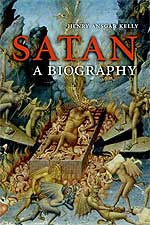Cambridge University Press released today a new book about Satan by a UCLA medievalist:
 , Satan: A Biography (Cambridge University Press, 2006).
, Satan: A Biography (Cambridge University Press, 2006).
Buy from Amazon.ca | Buy from Amazon.com
Here is the book description from the publisher:
Christians traditionally think of Satan as Lucifer, God’s enemy, who rebelled against Him out of pride and then caused Adam and Eve to sin. But, as Kelly shows, this portrayal is not biblical but a scenario invented by the early Fathers of the Church which became the ‘New Biography of Satan’. The ‘Original Biography’ must be reconstructed from the New Testament where Satan is the same sort of celestial functionary we see in the Book of Job – appointed to govern the world, specifically to monitor and test human beings. But he is brutal and deceitful in his methods, and Jesus predicts that his rule will soon come to an end. Kelly traces the further developments of the ‘New Biography’: humankind’s inherited guilt, captivity by Satan, and punishment in Hell at his hands. This profile of Satan remains dominant, but Kelly urges a return to the ‘Original Biography of Satan’.
There is an interview with the author here, as well as an article in The Australian: Satan a victim of bad PR, professor says.
Sounds interesting, though I wonder if Kelly is being a bit reductionistic?
(HT Boing Boing)

For some reason I can’t connect to some of the links you provide but if the blurb is any indication then I would steer pretty clear of the book. Why trace the “original biography” of Satan back to the NT and not the pre-Christian apocalyptic works? The Christian view of Satan seems to be a conglomeration of Mastemaa, the other watchers et. al. I think all of this played into the Christian conception, directly or indirectly.
Jim
why not take ideas of satan from the actual bible… wow what a concept
I’ve been aware of the difference between the biblical/pseudopigraphal picture of Satan and the more modern / western mideival one for sometime now…but I haven’t read any good literature on the subject. Any good recommendations other than this book (which looks like it might not be the best place to start…) where I might find a good start on how to tackle this?